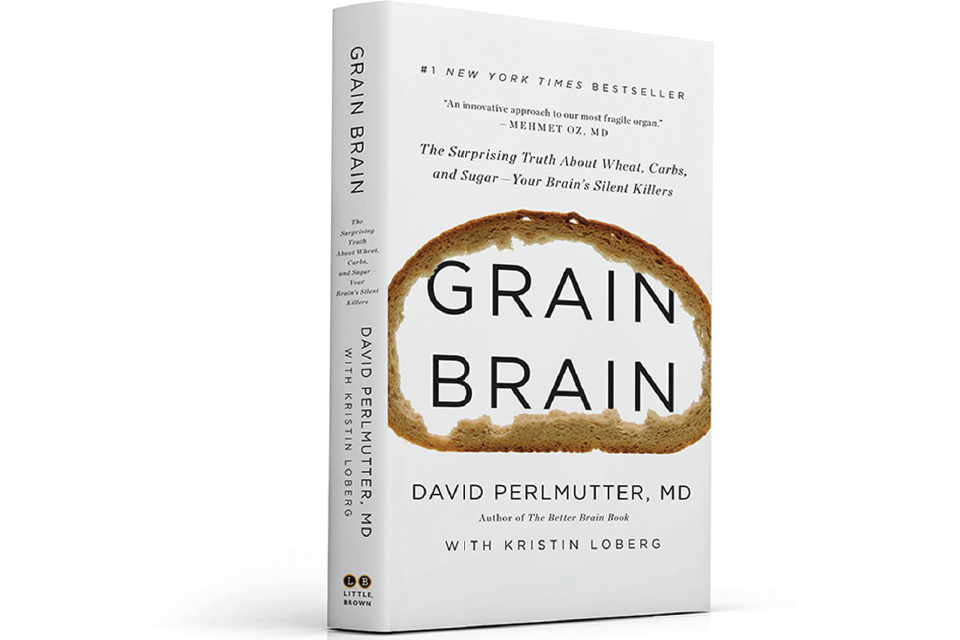Book Review: Grain Brain

You should eat no more than 60 grams of carbohydrates per day.
That’s what David Perlmutter, M.D., recommends in his New York Times bestseller Grain Brain: The Surprising Truth About Wheat, Carbs, and Sugar—Your Brain’s Silent Killers. Sixty grams of carbohydrates is roughly equal to two small pieces of fresh fruit, one whole English muffin, or 1 1/3 cup of fat-free plain yogurt. Most people, however, consume between 45 and 60 grams of carbohydrates per meal. I hope that, someday, we can end the low versus high carbohydrate debate and find some common ground, but until then, books such as Perlmutter’s—which claims dramatic improvements in symptoms of ADHD, dementia, Alzheimer’s, anxiety, decreased libido, and more—will always be extremely popular and alluring to those who suffer (or are watching loved ones suffer) from these conditions.
Perlmutter, a board-certified neurologist, believes inflammation caused by gluten, carbohydrates, and sugar is the cornerstone of most brain disease. His solution is a diet that is very low in carbohydrates and high in fat as a method to reduce inflammation and, therefore, protect the brain. Researchers have even studied the effects of very low carbohydrate diets (such as ketogenic diets) in treating debilitating conditions such as epilepsy and certain brain tumors. Sounds interesting so far, right?
Chris Kesser, an integrative medicine practitioner, has stated that diets like those recommended by Perlmutter are misguided. In a response to Grain Brain in a recent website post (“Do Carbs Kill Your Brain?”), Kresser wrote, “It’s important to realize that just because a low-carb diet can help treat neurological disorders doesn’t mean the carbs caused the disorder in the first place.” While he is in agreement that refined and processed carbohydrates (like flour and sugar) contribute to modern disease, Kesser disagrees with Perlmutter’s assumptions regarding unrefined, whole-food carbohydrates. He uses evolution, examination of traditional cultures, and a lack of supporting modern research as the basis for his rebuttal.
In Grain Brain, Perlmutter provides lists of foods: those that can be eaten freely throughout the day and those to be moderated (only one serving per day or ideally, just a few times a week). The eat-in-moderation list includes whole, sweet fruits (berries), cottage cheese, yogurt, carrots, and legumes—with the exception of hummus, which is made from chickpeas. I find it very hard to wrap my brain around how these whole foods should only be eaten a couple of times per week; it doesn’t make sense that an apple is inherently bad for health. Research has proven that foods Perlmutter has excluded are in fact quite nutritious and beneficial to our health.
While I agree with the notion that eating too many refined carbohydrates on a daily basis isn’t going to reduce anyone’s risk of chronic disease, fruits and whole grains shouldn’t be severely limited or deemed “bad.” These foods provide vitamins, minerals, antioxidants, and fiber, and should be an integrative part of a healthy diet to reduce the risk of disease. And I disagree with restrictions for athletes; those who participate in sports and try to limit their diet to 60 grams of carbohydrates per day may find themselves bonking sooner rather than later. An athlete’s increased need for carbohydrates can’t be met with that low amount of intake.
With regard to gluten sensitivity, it does exist. And although there isn’t evidence-based diagnostic testing for the condition yet, research is showing that, for some people, eliminating gluten from their diets can improve gastrointestinal symptoms, reduce brain fog, and improve fatigue. Yet, there is not a solid foundation from which to argue that 100 percent of the population should be on a gluten-free diet. Perlmutter also devotes much of his book to Type II diabetes. There is no doubt preventing Type II diabetes is vitally important; a balanced diet, exercise, and healthy weight are important components in diabetes prevention, and studies do indicate that a moderate carbohydrate diet can help control blood sugar.
It was nice to see Perlmutter state the importance of restful sleep habits and moderate exercise. Both of these methods are well-respected tools for improving health and reducing stress levels, which may increase inflammation in the body. He has been successful in encouraging a dialogue about inflammation and which parts of the American diet may or may not contribute to disease. However, I think Perlmutter misses the mark by overgeneralizing that all carbohydrates are bad and gluten should be avoided at all costs. In addition, Perlmutter gets bogged down in anecdotal patient success stories—an attempt to convince the reader that correlation does, in fact, mean causation. What research is currently directing us toward—a moderate, balanced diet rich in fruits, vegetables, whole grain, lean proteins and healthy fats—isn’t anything new and exciting. And while reiterating that idea might not make for a best-selling book, adopting the diet can reduce the risk of chronic disease and provide the energy you need to compete in the sports you love.






